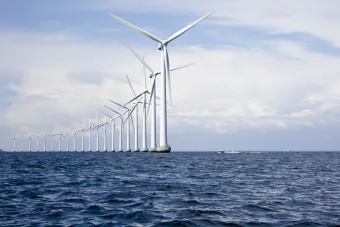
Scientists from the National Oceanography Centre, the UK’s leading ocean research centre, are joining a collaborative effort to assess the impact of offshore wind farms on marine ecosystems.
The £7m programme will allow experts to gather evidence to help inform marine policy and sustainable management solutions for offshore wind developments to tackle the climate crisis.
With expertise in marine physics and ocean climate, marine systems modelling, ocean biogeosciences and ocean technology and engineering, NOC scientists will be engaging in Ecological Consequences of Offshore Wind (ECOWind), a three part, cross-discipline programme.
The ECOWind programme is funded by the Natural Environment Research Council (NERC), the Crown Estate and the Department for Environment, Food and Rural Affairs (Defra). Scientists from the NOC will be working across all of the three funded ECOWind projects, ACCELERATE, ECOWINGS, and PELAgIO.
The scientists will investigate the ecological implications of accelerated seabed mobility around windfarms and the combined impacts of climate change and offshore wind farms on seabed habitats and organisms, including impacts to their distribution and biodiversity. By looking at the impact of the climate crisis and sea-level rise on the seabed, the ECOWind-ACCELERATE team will be able to gain an understanding of the baseline changes in sediment movement and how modifications to the seabed affect the wider marine ecosystem around the UK.
Uncertainty around impacts on seabird populations also remains a key issue for offshore wind development in the UK. By using ocean model climate projections to diagnose changes in the North Sea’s hydrodynamics and ecosystem, NOC scientists will add a climate change perspective to the ECOWINGS partnership, helping to produce strategic advice to safeguard the future welfare of seabird populations.
The programme will also support the development of evidence-based policy and marine management through interdisciplinary research that explores the consequences of offshore wind development on marine environments, marine wildlife, and wider ecosystem structures. To contribute to a greater understanding of projected changes, in PELAgIO the NOC will explore the impacts of offshore wind farm infrastructure on physical ocean conditions and the subsequent implications for primary productivity and ocean health. The team will collect and use in-situ data, collected from autonomous underwater vehicles, research vessels, and satellite observations, to build an ocean model able to represent the drag and mixing generated by the offshore wind farms. This observationally optimised model will be used to investigate the physical and biogeochemical impacts from offshore wind farms across local, regional and shelf scales and test how climate driven changes will interact with those introduced by the expansion of offshore wind farm infrastructure.
Mike Clare, Leader of Marine Geosystems Research at the National Oceanography Centre, said: “Our world-leading monitoring, modelling and prediction capabilities are specifically designed to provide expertise in tackling climate change. Research taking place at NOC is fundamental in developing an integrated understanding of the marine system and uses interdisciplinary tools to address fundamental societal challenges.
“The ECOWind programme brings great scientific institutions together and our involvement will help to provide crucial information on how ecosystems will respond to the expansion of UK offshore wind infrastructure, which is vital in understanding the functioning of the UK’s marine ecosystems and the viability of the UK’s net zero future.”
The UK commitment to reach net zero greenhouse gas emissions by 2050 was strengthened in 2020 with ambitious new targets for at least 68% reduction in greenhouse gas emissions by 2030. This target has prompted the advancement of offshore wind infrastructure within the UK. The ECOWind programme draws upon the marine transdisciplinary research community to address the potential impacts this may have on marine ecosystems, as the potential consequences of this expansion objectives is yet to be explored.